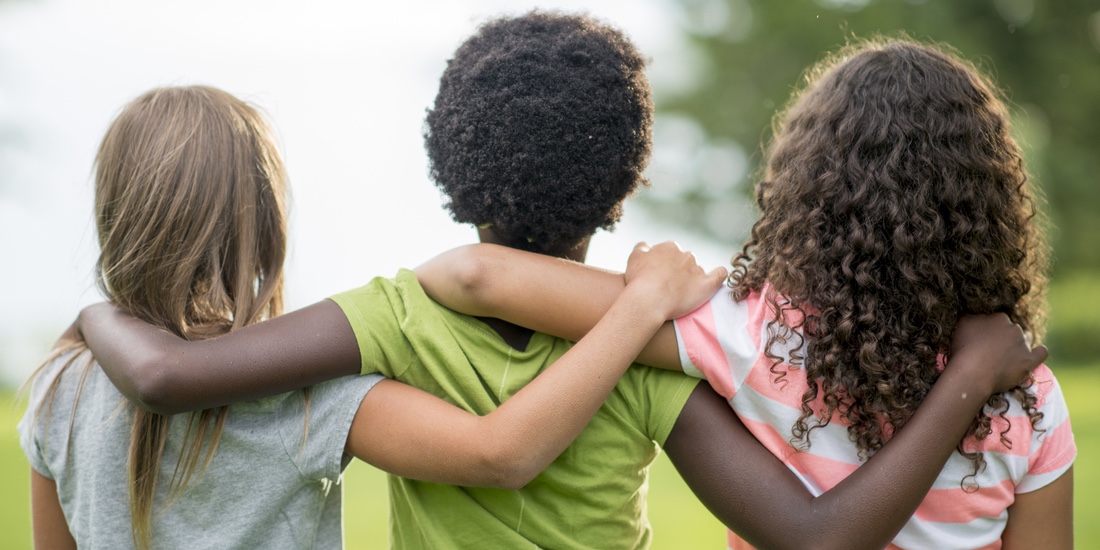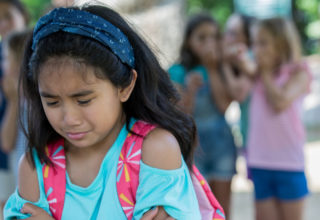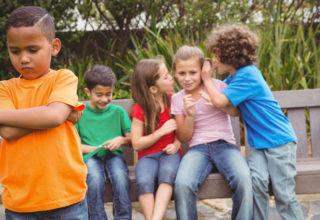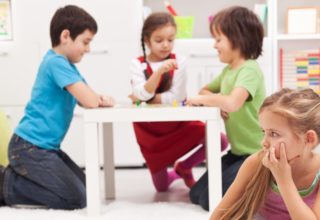Parents are often unsure of how to talk to young children about race. But it is real and it is everyday – and an important opportunity to do right by our children. Parents should talk about race. Here’s how to start the conversation.
Learn
“I like your skin because it’s white.”
“I have skin that’s really dark.”
“I want to be darker.”
“I want to be lighter.”
“I don’t want to play with her because her hair feels funny.”
These are a few examples of how children may bring up the subject of race. When children bring up this topic, especially when it is around skin color or hair texture, it can feel very charged and uncomfortable for adults. But race is a typical curiosity for young children.
Basic Concepts
- Children as young as six months notice physical differences. We know that if adults react with shame, anger or nervousness, children learn that they have asked a taboo question. They may then conclude it is not safe to bring up such things.
- Make your child’s learning safe and authentic: embrace your child’s questions, use concrete language to answer their questions, develop a vocabulary around ethnicity, expand their thinking, and provide activities to explore individual and peer identities. They’re not too young to talk about race!
- More reasons for why parents should talk about race.
Just Remember
- Race is a typical curiosity for young children. Don’t avoid or downplay it. Seize the opportunity to reach your child where they are developmentally to build their self-esteem and to build their understanding of the people in the world around them.
- Children are concrete thinkers – they like facts and explanations.
- You are your child’s first teacher. How would you prefer your child learn about race and identity – from a stranger making comments on the street, or from you, reflecting your values and beliefs?
P.S. – There’s a difference between race and ethnicity.
Do
Core Marbles
- Be specific – children like facts.
- Ask your child questions.
- Talk about what you believe and what is important to you.
- Children notice injustice. Name it and explain it.
- Normalize talking about skin color, ethnicity, culture and language.
- Remind your child of similarities.
- Explain that skin color is just one part of who you are.
- Highlight the beauty in your child.
- Use books to help develop awareness.
Tips for Talking with Your Child
- Be specific. Children like facts – Use proper, socially relevant terms.
- For example, “My skin is white. Your skin is black.”
- It is important to use terminology that children will encounter in the real world.
- For example, “My skin is white. Your skin is black.”
- Ask questions – Children may not be going in the direction that you assume with their comments. Use questions to explore what information they are looking to get from you.
- Talk about what you believe and what is important to you
- For example, “In our family we are friends with people of all skin colors.” “Our house is a safe place to talk about what you like and feel.”
- Children notice injustice. Name it and explain it – Don’t leave children to draw their own conclusions.
- For example, “I noticed that Jane said Mary couldn’t play because her skin is a different color. That is hurtful and wrong. We don’t exclude people because of what they look like. I wonder why Jane said ‘No’ to Mary? Sometimes people say hurtful things when they don’t understand something or because they are scared.”
- There are many reasons children exclude other children from play. When children exclude based on race, there is often something deeper going on. We encourage families to explore what this might be. Children have a sophisticated emotional world.
- Research proves that parents should acknowledge race in conversations with their child.
- For example, “I noticed that Jane said Mary couldn’t play because her skin is a different color. That is hurtful and wrong. We don’t exclude people because of what they look like. I wonder why Jane said ‘No’ to Mary? Sometimes people say hurtful things when they don’t understand something or because they are scared.”
- Normalize talking about skin color, ethnicity, culture and language – Don’t be afraid to
name ethnic origin. Use vocabulary that makes all shades of skin beautiful.
- For example, “My new friend, Ana, is a Latinx. She taught me a new word in Spanish today.”
- “We all have different skin colors. We often say ‘white’ or ‘black’ to describe a large group of people. But when we take a closer look at our skin color, we all have different shades of skin. How would you describe your skin color?”
- “People born in the same country may have similar or different skin colors. For example, America is not a skin color. Chinese, Indian – or any other country – are not skin colors.”
- Remind your child of the similarities
- For example, “You’ve got brown skin. And Tom has white skin. But you both love ice cream.” or “You both love playing family.”
- We Are All Alike…We Are All Different connects well with children on this aspect. Written by children, for children.
- Explain that skin color is just one part of who you are, but that understanding who someone is means getting to know them fully and on the inside – Ask your child to share what they’re an ‘expert’ at, what they’re working on, their favorite part of their physical selves, what they like and don’t like (e.g., foods, soccer, ballet, etc.).
- Skin Again is especially good at addressing this.
- Highlight the beauty in your child – Make your child feel proud of their physical identity. “You are my beautiful, brown baby!” “You are my lovely, rosy sweetheart!”
- Use books to help your child develop awareness around race
- “I noticed that all the characters in this book are one skin color. I wonder why there aren’t people of other skin colors in this book. We have friends and neighbors who are many different skin colors.”
- Actively seek books to read with your child that reflect the diversity of our communities and that illustrate how diversity is a natural part of life.
Simple Activities
- What colors are in my skin? – Explore shades of skin color with paint. Have your child mix paint colors to match their own skin color and those of their friends.
- Face fun – Cut photos of faces of your child, family and friends into three pieces. Try to fit the pieces back together.
Our Favorite Links

Jetta Jacobson, Teacher + Early Childhood Professional
Jetta Jacobson holds a M.A. and teaching credential in Early Childhood Special Education from San Francisco State University. She taught in a fully inclusive preschool for 20 years and now shares her knowledge and experiences as an Instructional Coach for San Francisco Unified School District. Jetta also teaches early childhood courses at San Francisco State University.
While we may agree that it is important to speak about issues of race and racism, these layered and personal...
A practical guide for navigating conversations with your child about racism, including helpful What You Could Say scripts on important...
Teasing, name-calling, social exclusion or any other general unkindness that specifically relates to race, gender, religion or any aspects of...
“Empathy is when you’re able to understand and care about how someone else is feeling.” -Mark Ruffalo, Sesame Street
The importance of being an upstander and the skills a child should learn to stand up and speak up for...
Core concepts your child should know when being an upstander and how to practice them at home among daily routines.
Is your child able and ready to say/do the upstanding thing? Help your child know what to say in-the-moment when...
Teach your child a strong Friend Skill Set that can help them establish healthy, happy friendships and that will support...
Strategies, tools and scripts for teaching your child how to practice being a ‘good’ friend.
Watching a child turn to you crying for the first time because “A friend said ‘I can’t play’”, is a...
Social exclusion is a main theme in a child’s development and there are many reasons why it happens. Empower your child to...
When your child starts demonstrating behaviors that show they are trying to ‘fit in’ or wants to ‘belong to a...
Teach your child to *THINK* before they speak – to consider the impact of their words (vs. their intent). A helpful...
Empower your child with a valuable life skill – teach them how to express their emotions and desires during conflict.
Help your child learn how to resolve a social conflict on their own with this framework – Wheel of Choices.
Go beyond “How was your day?” Our Top 10 favorite conversation starters can give you insight into what matters to...
A simple tip sheet for how to praise your child. Something more than “Good job” or just commenting on process and...
The benefits of mindfulness and how it can help your child thrive. How to naturally and authentically infuse mindfulness into...
Keep your child safe from danger and empower them to be safe. Teach your child to protect themselves with important...
Answers to our most popular questions on a heavy subject. From “How do I explain…” to “How do I teach…”...




















